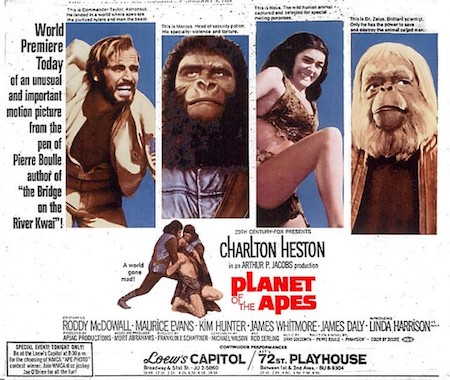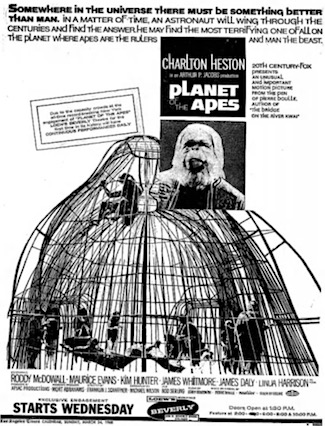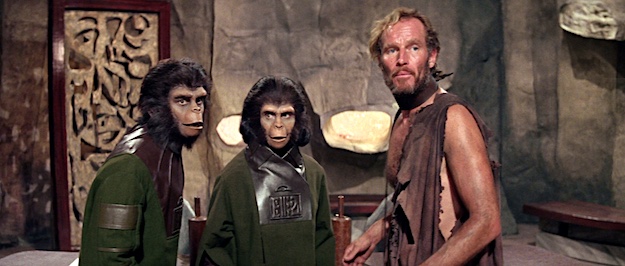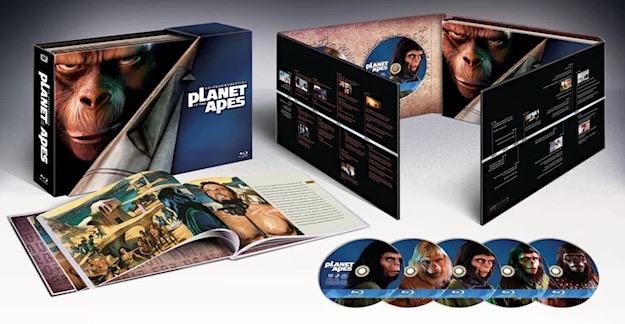
Coate: In what way was Franklin Schaffner an ideal choice to direct Planet of the Apes, and where does the film rank among his body of work?
Bond: I think Patton and Planet of the Apes are Schaffner’s best films — in fact, I think Pauline Kael said she thought Planet of the Apes was a better-directed film than Patton, which won the Best Picture and Best Director Oscar. Schaffner was a very intelligent director and he was at home dealing with politics and ideas — he’d made a great political thriller, The Best Man, before Planet of the Apes.
Cork: Schaffner is a tremendously under-rated director. All of his films have merit, but Planet of the Apes, Patton, Nicholas and Alexandra, Papillon, Islands in the Stream, and The Boys from Brazil are all great films. I rank Planet of the Apes and Patton as his two greatest films. I was fortunate enough to meet him once. As a student at USC, my friend Jeff Burr let me know that Schaffner was going to talk to a class he was taking after a screening of Islands in the Stream. It was a small group, and Schaffner humored all our questions. He struck me as a humble man, but he really was fascinated by the role of the individual in the sweep of history.
I think he was greatly affected by his own life, having been born to missionaries in Japan, seeing the rise of a brutal form of imperialism there, fighting in World War II, and seeing the Cold War, the push-back against Civil Rights and McCarthyism rise up here. He never directed for The Twilight Zone, but he worked on many Rod Serling projects in the mid-50s. He was deeply affected by the death of JFK, whom he really saw as a beacon of hope for the nation.
He was the perfect director for Planet of the Apes because he didn’t make many films about heroes and villains. He made films about people. He knew how to make us root for Taylor, but see how his arrogance (and our own) will need to be thrown back in his face.
But it is important to cite three other vital contributors to Planet of the Apes. The first is Pierre Boulle who wrote the novel, and wrote the novel The Bridge over the River Kwai that was adapted into David Lean’s classic film. His premise and vision cannot be undervalued. The second is Rod Serling. Planet of the Apes in many ways is the ultimate Twilight Zone episode. Serling penned the ending of the film, which is reminiscent of many classic Twilight Zone episodes. Finally, there is Michael Wilson, a brilliant, formerly blacklisted writer who did the final rewrites on the script. A lot of the indignation that lies just below the surface of the film can be credited to him.
Pfeiffer: Blake Edwards had supposedly been considered to be the director. Can you imagine? Fortunately, the producer, Arthur P. Jacobs listened to Charlton Heston, who had made a good film called The War Lord with Schaffner a few years before. He was brought on board as director and proved to be the perfect choice. Schaffner knew how to find the perfect balance between suspense and humor, without ever overdoing the latter. It would have been so easy for the film to have slid into satire just to get a few cheap laughs but Schaffner’s direction avoided this. The movie certainly ranks with Patton as his greatest film achievements, though they are pointless to compare for obvious reasons. Let’s just say that they demonstrate the diverse body of work Schaffner was capable of excelling in. He was underrated. I think his career was hurt by the expense failure of Nicholas and Alexandra. He did manage to make the occasional high profile hit such as Papillon and The Boys from Brazil. And Islands in the Stream is a wonderful film, but for the most part, he never got the high profile projects he deserved.
 Coate: How do the 1970s sequels and the recent remakes and reboots compare to the original movie?
Coate: How do the 1970s sequels and the recent remakes and reboots compare to the original movie?
Bond: The first three sequels I think all have their strengths. Beneath the Planet of the Apes is just a fun adventure with the crazy twist of the bomb-worshipping mutants. Escape from the Planet of the Apes is really amazing because it is a fish out of water comedy that ends with murder and infanticide, and it’s a tonal shift that is inevitable as we see the character played by Eric Braeden realize very quickly that Zira and Cornelius, these lovable chimpanzee characters, are really an existential threat to human civilization, and he’s absolutely right. He takes on one of the most shocking acts of villainy you’ll ever see in a movie, but given the circumstances, from his perspective he’s completely right and completely justified. And then Conquest of the Planet of the Apes, with its allegory to the Watts Riots, is one of the most politically daring science fiction movies ever made. After that, Battle for the Planet of the Apes and the Tim Burton movie from 2001 are really much less ambitious adventures, and the three reboots are very clever, groundbreaking technical achievements that function by making you really believe in the simians as flesh and blood characters — it’s a more subtle approach that doesn’t wear its politics on its sleeve quite so much but still says a lot about empathy and humanity’s responsibility for the world we live in.
Cork: I love Paul Dehn who wrote on many of the 1970s sequels, but they are pale shadows compared to the original. Beneath the Planet of the Apes borders on dreadful, although it is worth seeing for the last few minutes, which borrows (or steals) from Bridge on the River Kwai, Dr. Strangelove and the 1967 Casino Royale! The addition of Paul Frees, the voice of The Haunted Mansion, brings something less than the appropriate solemnity to the situation.
Escape from the Planet of the Apes is quite delightful until the ending. If you want to make a small child cry, show them Escape. Sure, we’re all happy Caesar lives, but things do not end well. The Shape of Water owes much to this film.
Conquest of the Planet of the Apes feels like a TV movie, and its retcon sequel, Battle for the Planet of the Apes should be avoided at all costs.
I loved the TV series when it came out and watched numerous episodes of the animated series, but I haven’t seen them since.
Tim Burton’s remake falls flat for me with the middle becoming particularly muddled. There is something very wrong about unironically putting Mark Wahlberg, a man convicted of attempted murder for a racist attack, in the Planet of the Apes universe.
The current series…hmmm. I liked the first one. Watching CGI gorillas magically get on horses without crushing them got old fast. Someone simply ran out of ideas for War for the Planet of the Apes. I have seen The Great Escape, Stalag 17 and The Ten Commandments. They are all better films. All would have been forgiven if the snow soldiers at the end had pulled off their masks to reveal that they were also apes. Somewhere, they lost the thread of what made Planet of the Apes so great. For me, I want to go back to sharing those Planet of the Apes comic books at summer camp, looking at those bubble gum cards, sitting at the drive-in with my aunt and feeling that sense of wonder that only the first film brings.
Pfeiffer: No one thought there could be a sequel to Planet of the Apes and Charlton Heston refused to be part of it. But Fox was in deep financial trouble at the time and studio boss Richard Zanuck imposed upon him to make Beneath the Planet of the Apes. Heston grudgingly did so because he felt obligated to Zanuck for championing the first movie when other studios turned it down. Heston agreed to give Fox one week of his time and no more. His appearances are vital to the first sequel, even though they cast James Franciscus as a Heston-look-a-like. By the way, Heston always maintained that he never saw Beneath but insisted that the world be destroyed in it so there could be no further sequels. Little did he realize that Hollywood screenwriters can accomplish anything when profits are at stake. The film was a major hit but the following sequels, though clever and good in their ways, were a case of diminishing returns. By the time Battle of the Planet of the Apes was released, the budgets had been cut to TV movie levels and the series would end until the reboots decades later. The newer films benefit from being able to stand on their own for a younger generation without being compared to the originals. They also benefit from today’s technology which has helped launch a rebooted series that has been quite successful.
Coate: What is the legacy of Planet of the Apes?
Bond: I think this is very simple as far as what the 1968 movie was trying to say. In that movie you have a religious majority suppressing ideas, suppressing science and exercising rampant, violent racism against another intelligent species. Now look at the situation we’re in today where we have a President openly dismissing science, stripping scientific information off of government websites and stripping funding from programs to advance scientific research and technology that might help us keep this planet habitable for billions of people. We literally have a movement that is declaring that the Earth is flat. All of that would have likely been laughed at if presented in 1968 during the space race when American policy was all about advancing science, technology and knowledge. Add to that the movements of nationalism and racism that are completely out front today. So the original Planet of the Apes I think is actually even more relevant now than it was in 1968.
Cork: I wish I could say that it was a film that unleashed a great torrent of brilliant Swiftian satire, or that its release did what Sammy Davis Jr. hoped it would do — make a real impact on race relations in America. This is the film that made Franklin J. Schaffner one of the hottest directors in Hollywood. It became a justification for studios to greenlight a handful of mediocre, dark, fatalistic science fiction films for a few years. Charlton Heston, who in Apes is basically playing the same arrogant character that he played in The Naked Jungle in 1954, plays the same type again in The Omega Man, three years later, once again living in a world turned upside down. I think the real legacy is very similar to The Twilight Zone. Both inspired millions of viewers to think about the world a little differently. For those who didn’t feel challenged to think, the film is still great entertainment. For those the film touched, they became a bit more aware of the hypocrisy, ignorance, hubris, and irony that so defines our world.
Pfeiffer: It’s a landmark in the science fiction film genre that paved the way for so many other intelligent, highly compelling sci-fi films. It’s impossible to know how many filmmakers it influenced and still continues to influence. I should also mention that Charlton Heston’s son, Fraser, himself a talented director, once asked me what I thought his father’s best performance was. I think he was surprised when I said Planet of the Apes. It took a great deal of skill for Heston to dominate a film populated by other actors in ape masks and he did so magnificently. He’s also a bit of a bastard, not very likable at all, which went against the astronaut-as-hero scenario. I think that’s also part of the film’s legacy in that it afforded a Hollywood legend one of his greatest roles.
Coate: Thank you — Jeff, John, and Lee — for sharing your thoughts about Planet of the Apes on the occasion of its 50th anniversary.

IMAGES
Selected images copyright/courtesy APJAC Productions, 20th Century-Fox Film Corporation, 20th Century Fox Home Entertainment.
SPECIAL THANKS
John Hazelton
- Michael Coate
Michael Coate can be reached via e-mail through this link. (You can also follow Michael on social media at these links: Twitter and Facebook)





